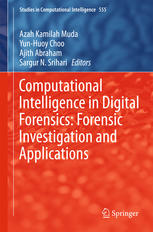

Most ebook files are in PDF format, so you can easily read them using various software such as Foxit Reader or directly on the Google Chrome browser.
Some ebook files are released by publishers in other formats such as .awz, .mobi, .epub, .fb2, etc. You may need to install specific software to read these formats on mobile/PC, such as Calibre.
Please read the tutorial at this link: https://ebookbell.com/faq
We offer FREE conversion to the popular formats you request; however, this may take some time. Therefore, right after payment, please email us, and we will try to provide the service as quickly as possible.
For some exceptional file formats or broken links (if any), please refrain from opening any disputes. Instead, email us first, and we will try to assist within a maximum of 6 hours.
EbookBell Team

5.0
48 reviewsComputational Intelligence techniques have been widely explored in various domains including forensics. Analysis in forensic encompasses the study of pattern analysis that answer the question of interest in security, medical, legal, genetic studies and etc. However, forensic analysis is usually performed through experiments in lab which is expensive both in cost and time. Therefore, this book seeks to explore the progress and advancement of computational intelligence technique in different focus areas of forensic studies. This aims to build stronger connection between computer scientists and forensic field experts.
This book, Computational Intelligence inDigital Forensics: Forensic Investigation and Applications, is the first volume in the Intelligent Systems Reference Library series. The book presents original research results and innovative applications of computational intelligence in digital forensics. This edited volume contains seventeen chapters and presents the latest state-of-the-art advancement of Computational Intelligence in Digital Forensics; in both theoretical and application papers related to novel discovery in intelligent forensics. The chapters are further organized into three sections: (1) Introduction, (2) Forensic Discovery and Investigation, which discusses the computational intelligence technologies employed in Digital Forensic, and (3) Intelligent Forensic Science Applications, which encompasses the applications of computational intelligence in Digital Forensic, such as human anthropology, human biometrics, human by products, drugs, and electronic devices.